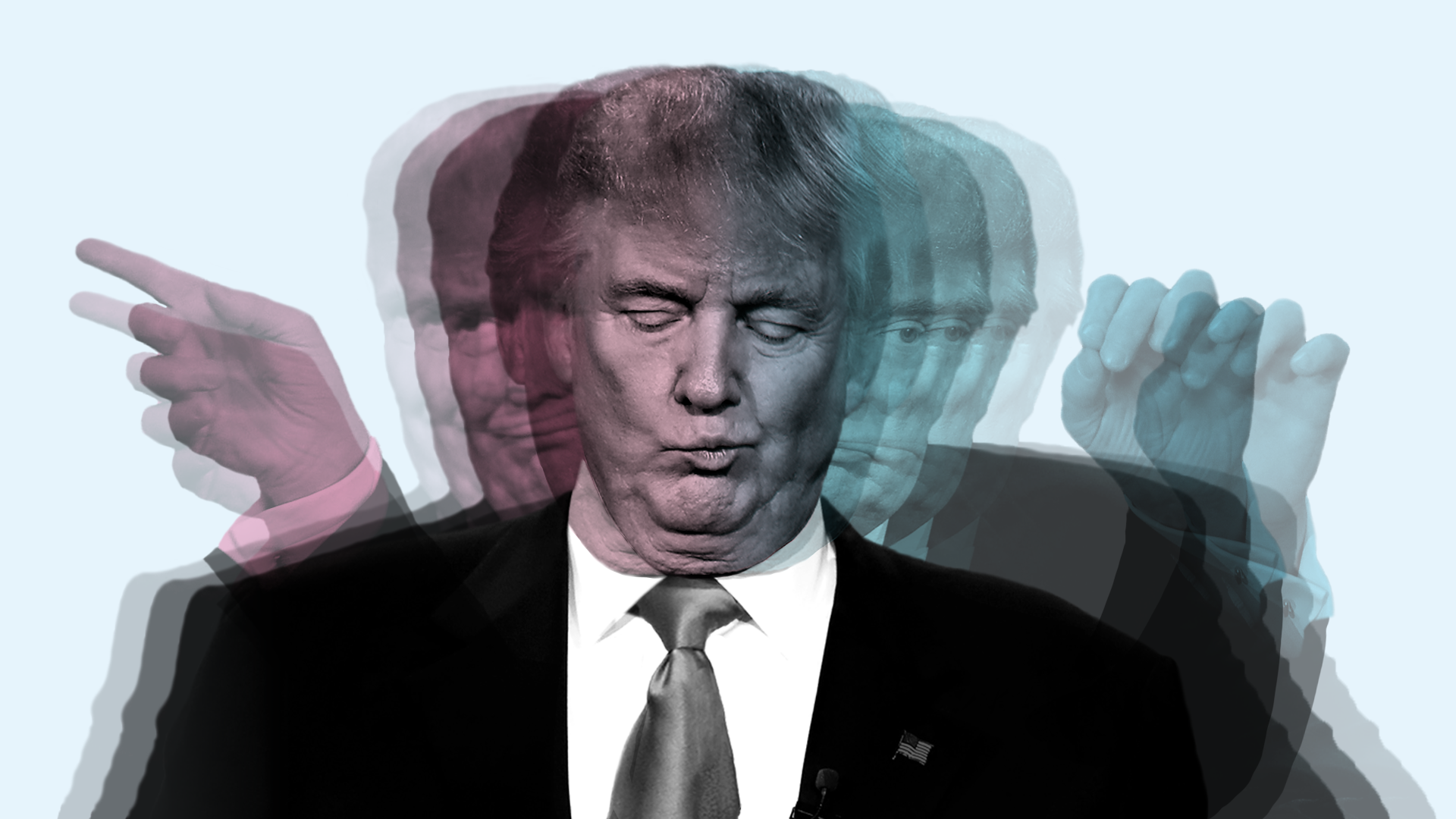Trump's winding road to strikes in Syria
Add Axios as your preferred source to
see more of our stories on Google.

Illustration: Sarah Grillo/Axios
President Trump launched strikes on Syria this evening, in a combined effort with France and the U.K. "My fellow Americans, a short time ago, I ordered the United States Armed Forces to launch precision strikes on targets associated with the chemical weapons capabilities of Syrian dictator Bashar al-Assad," Trump said.
Flashback: Just a little over a week ago, Trump was urging a total withdrawal from Syria, and his administration was anticipating a “rapid end” to military operations there. Below, how we got from there to here...
Setting the stage
- April 7, 2017: Trump orders missile strikes in Syria three days after a Sarin gas attack in the town of Khan Sheikhoun. The strikes were limited in scope, targeted at the base from which the regime's chemical attack was launched.
- March 11, 2018: Claiming the U.S. planned to bomb Syria under false pretenses, Valery Gerasimov, the head of Russia’s General Staff, said: “Russia’s armed forces will take retaliatory measures against the missiles and launchers used” in attacks that pose “a threat to the lives of our servicemen.”
Last week's plan: Get out
- March 29, 2018: Trump tells advisors he wants to leave Syria "very soon," then makes that statement publicly the following day at a rally, adding: "Let the other people take care of it now." His rationale: The U.S is in Syria to fight ISIS, and the group is nearly defeated.
- April 4, 2018: Sarah Sanders says the U.S. military mission in Syria is coming to a "rapid end," but says the U.S. won't pull out until ISIS is completely defeated. The White House declines to lay out a wider plan for Syria.
The latest chemical weapons attack
- April 7, 2018, (Saturday): Reports emerge of a massive chemical weapons attack in Douma, Syria, the last town under opposition control in the besieged enclave of eastern Ghouta, per the Guardian.
- The World Health Organization reports hundreds have been injured, and as the death toll climbs into the dozens gruesome pictures surface of the victims.
This week: Looming strikes and launch
- April 8, 2018 (Sunday): Trump calls out Iran and Putin for backing Syrian dictator Bashar al-Assad in a tweet and promises there will be a "big price to pay" for the chemical attack. He also speaks with French President Emmanuel Macron.
- April 9, 2018 (Monday): Trump says he will make a decision on how to respond to the attack within 24 to 48 hours.
- There is an airstrike on a base in Syria, which Syria and Russia say Israel carried out.
- April 10, 2018 (Tuesday): U.K. Prime Minister Theresa May and Trump speak and condemn Syrian President Bashar al-Assad’s “vicious disregard for human life” and agree to “not allow the use of chemical weapons to continue.”
- Russia vetoes a resolution at the UN that would determine who was behind the chemical weapons attack. Syria's government denies it carried out the attack.
- Saudi Crown Prince Mohammed bin Salman says Saudi Arabia will join the response "if our alliance with our partners requires it."
- April 11, 2018 (Wednesday): Trump announced his intention to launch strikes in Syria, tweeting: "Get ready Russia, because they will be coming." He says relations have hit a new low but "there is no reason for this," adding: "stop the arms race?"
- Defense Secretary James Mattis says the U.S. is still investigating the attack. "We’re still working on this ... We stand ready to provide military options if they are appropriate as the President determines."
- April 12, 2018 (Thursday): Trump made “no final decision” on military action after meeting with his national security team. The U.S. had blood and urine samples from the chemical attack that "tested positive for chemical weapons."
- April 13, 2018 (Friday): Trump announces strikes: "My fellow Americans, a short time ago, I ordered the United States Armed Forces to launch precision strikes on targets associated with the chemical weapons capabilities of Syrian dictator Bashar al-Assad."
- Mattis: “Clearly the Assad regime did not get the message last year."
What to watch now: Russia. Although the strikes were targeted, Gen. Joseph Dunford, the commander of the joint chiefs of staff, said the Russians were not told in advance what the targets were (although the airspace was normally de-conflicted). If Russian armed services are hit, and it follows through on its threat to strike missiles down that affect its armed services, things could heat up quickly. Earlier Friday Russia's UN envoy did not rule out war between Russia and U.S. if strikes take place.
- There is no evidence of a Russian response yet, per Gen. Dunford
- The overlapping alliances and rivalries in the region (Turkey, Iran, Russia, U.S., Assad, rebels, ISIS...) also create a hotbed for clashes.
- Mattis said of course he cannot guarantee there won't be a leak in the air of the chemicals.
Go deeper: Trump's 3 options for striking in Syria ... Mapped: The groups who control Syria
Sign up for the Axios World newsletter to get more stories like this.
